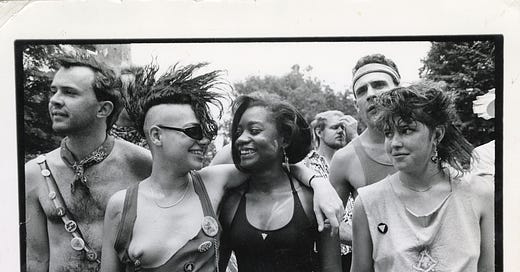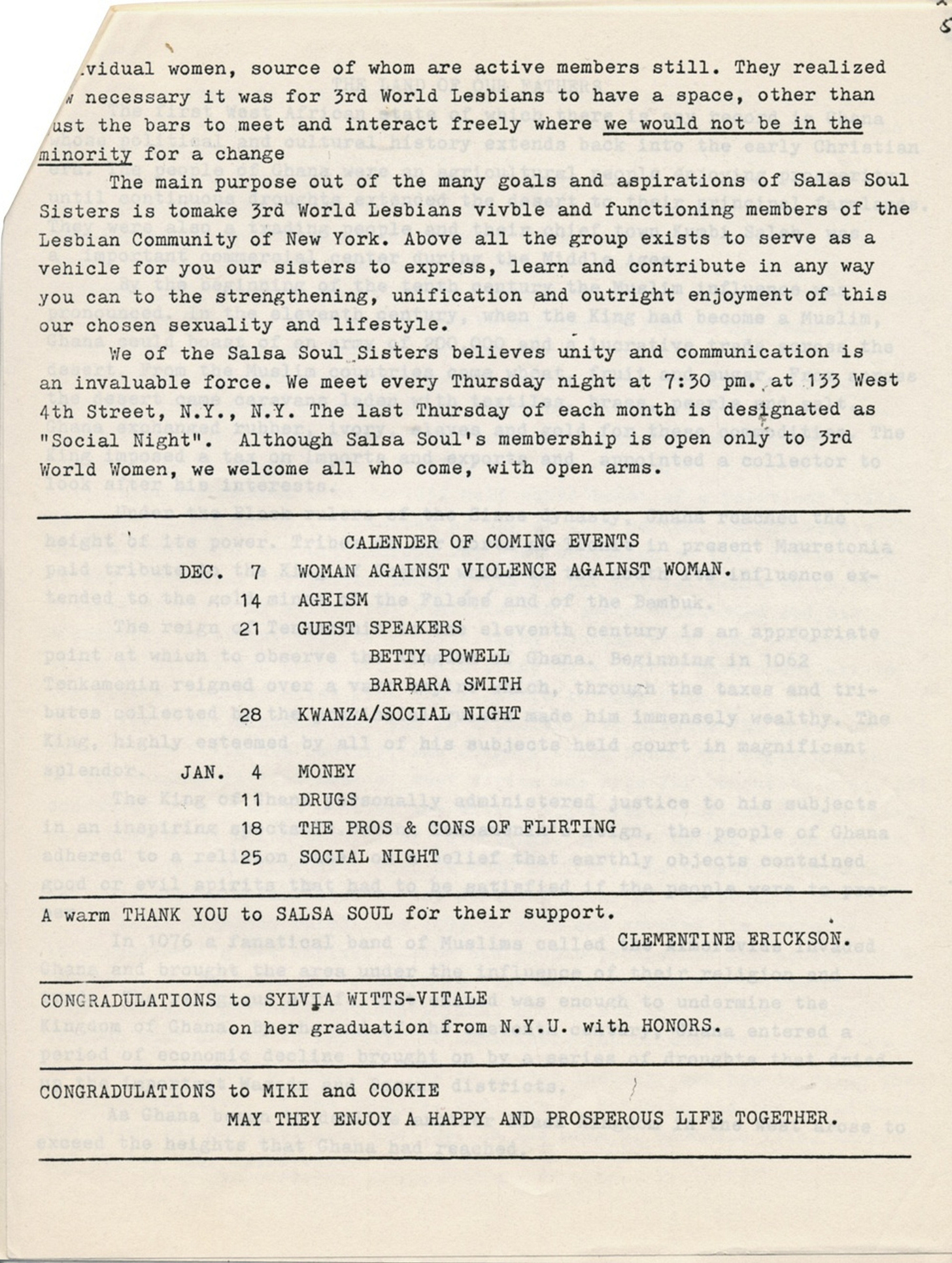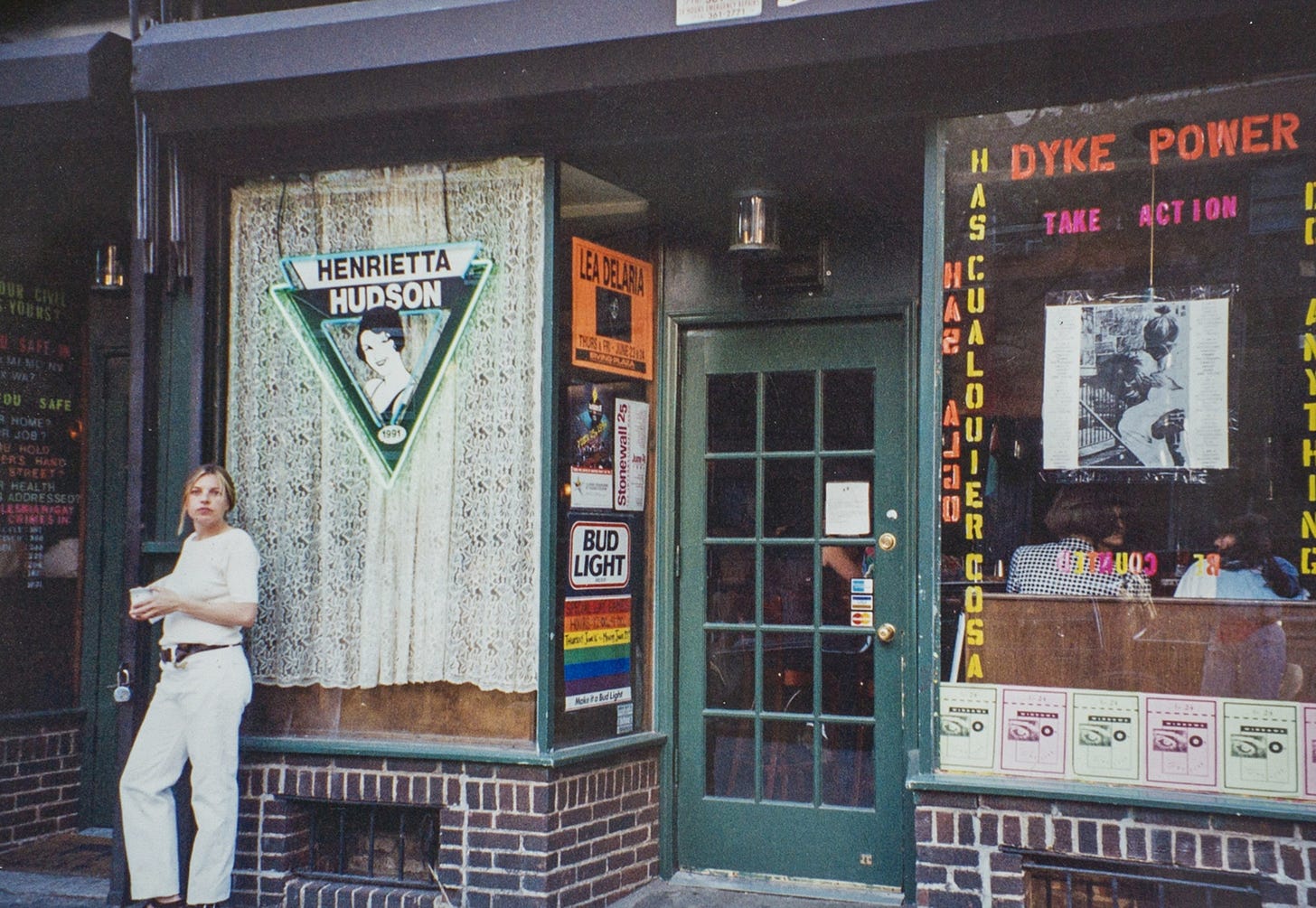Pride Month TFI Digital Archive Selections and Queer Archives Roundtable Reflections
Explore TFI Digital Archive Pride Month Month Selections and learn about our recent Queer Archives Roundtable, in collaboration with the LGBTQ Artists Archive Project and The American LGBTQ Museum.
As Pride Month comes to a close, TFI reflects on the profound impact of LGBTQ+ history within the broader feminist cultural landscape. In particular, lesbian and trans communities have pushed feminist movements towards inclusivity and radical change, advancing work in reproductive justice, bodily autonomy, labor rights, and health activism. Without LGBTQ+ history, the feminist cultural record remains incomplete.
Below is a list of incredible organizations, archival collections, and cultural projects preserving LGBTQ+ history to explore, in addition to Pride Month selections from the TFI Digital Archive.
TFI Digital Archive: Pride Month Selections
Gay Pride March, June 1986
Donna Binder, Gay Pride March, 1986.
Copyright held by Donna Binder; digitized through a partnership with The Feminist Institute, 2023.
See record.
This digital capture is a photograph taken by Donna Binder of friends at the 1986 Gay Pride March in New York City. Binder is a photojournalist with over 25 years of experience in creating, distributing, and fundraising for social justice and cultural projects. Much of her work documents critical activism across queer and feminist causes, including (but not limited to) HIV/AIDS, reproductive justice, and anti-war movements.
Astraea Lesbian Writers Fund Reception and Reading Flyer
A.I.R. Gallery, Astraea Lesbian Writers Fund Reception and Reading Flyer, 1991.
Copyright and image courtesy of A.I.R. Gallery and New York University. Digitized as part of a partnership between A.I.R. Gallery and The Feminist Institute, 2022.
See record.
This digital capture is a flyer from an A.I.R. Gallery fundraiser in support of the Astraea Lesbian Writers Fund, which provided financial support to LGBTQ+ authors. The fund has supported numerous feminist icons, including Audre Lorde, Dorothy Allison, Gloria E. Anzaldúa, Cheryl Clarke, Eileen Myles, Jewelle Gomez, and others. This ephemera highlights how feminist artist collectives, like A.I.R. Gallery, were often building coalitions with LGBTQ+ organizations.
Salsa Soul Sisters Announcements
Salsa Soul Sisters, Announcements, exact date unknown.
Image courtesy of Cassandra Grant. Copyright held by Addresses Project, ingested into the TFI Digital Archive through a partnership between The Feminist Institute and Addresses Project, 2022.
See record.
This digital capture is a Salsa Soul Sisters announcement. It features upcoming events, including a talk by Barbara Smith, alongside social events and congratulatory messages for community members. The Salsa Soul Sisters is the oldest Black lesbian organization in the United States, operating in New York City from 1974 to 1993. To learn more about Salsa Soul Sisters, explore Cassandra Grant’s Oral History Transcript in the Addresses Project Collection1 in the TFI Digital Archive.
Patron outside Henrietta Hudson
Addresses Project, Patron outside Henrietta Hudson, exact date unknown.
Image courtesy of Lisa Cannistraci. Copyright held by Addresses Project, ingested into the TFI Digital Archive through a partnership between The Feminist Institute and Addresses Project, 2022.
See record.
This digital capture features a photograph of Henrietta Hudson, a historic lesbian bar in New York’s West Village. Displayed in the window is a bold message reading, “DYKE POWER / TAKE ACTION,” exemplifying the inherently political nature of lesbian communities and their deep intersections with feminist movements. Near the entrance, a flyer promotes an upcoming performance by Lea DeLaria, a longtime icon in the lesbian community. This image underscores the vital political and social roles that bars have played in the lives of LGBTQ+ people.
QUEER ARCHIVES: The Impact of Digital Technology and Creating Public Access
On June 5th, TFI co-hosted a roundtable discussion about increasing public access to queer archives using digital technology with the LGBTQ Artists Archive Project and The American LGBTQ+ Museum (ALM).
Vivian Stein’s and Allison Elliott’s presentation, QUEER ARCHIVES: The Impact of Digital Technology and Creating Public Access, 2025. Photo credit: Leandro Justen.
Allison Elliott and Vivian Stein shared their collaborative digitizing work for Lola Pashalinski’s collection and Pashalinski’s recently published PAL site. Allison also joined Suhaly Bautista-Carolina to discuss Queer Legacies Project2, a collaborative program between TFI, ALM, and SAGE, and its community-centered approach.
Steven Fullwood and Chris Stahling presented on the Nomadic Archivists Project, as well as the In the Life Archive (ITLA), originally known as the Black Gay and Lesbian Archive (BGLA) at the Schomburg Center for Research in Black Culture, and its influence on the In The Life Archive 2.0, spearheaded by Stahling. Finally, Tanisha Jones and Alyce Dissett closed out our conversation by presenting on the LGBTQ Artists Archive Project and its efforts to preserve queer creative legacies.
The roundtable served as a powerful example of collaborative practice, highlighting how memory workers continually contribute to a broader archival ecosystem, one that helps fill the gaps in our cultural record to more accurately reflect the histories and lived experiences of marginalized communities.
To learn more about the Addresses Project and TFI’s partnership, read or listen to an interview with collaborators Gwen Shockey and Riya Lerner on TFI’s Substack.
To learn more about Queer Legacies Project, read Making Sure Queer Lives Are Not Forgotten: Preserving The Personal Histories Of LGBTQ+ Elders through the Queer Legacies Project, Suhaly Bautista-Carolina, International Council of Museums, published June 20, 2025.









